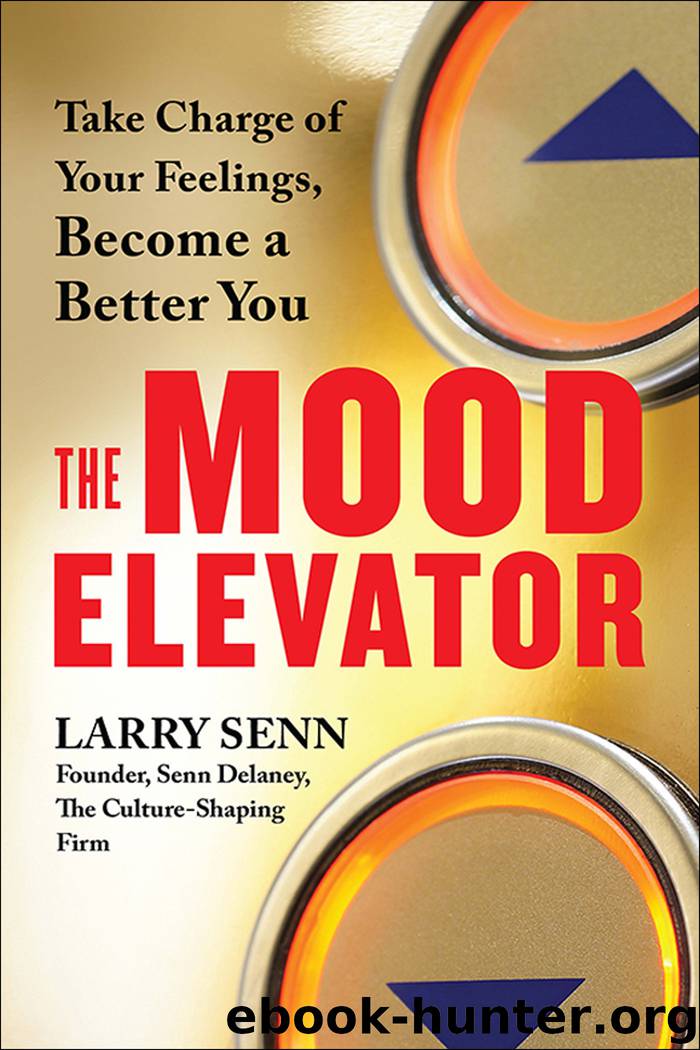The Mood Elevator by Larry Senn

Author:Larry Senn [Senn, Larry]
Language: eng
Format: epub
ISBN: 9781523084616
Publisher: Berrett-Koehler Publishers
Published: 2017-04-15T04:00:00+00:00
Getting Enough Sleep
The most important recovery mechanism people have is simply getting enough sleep. American author and entrepreneur E. Joseph Cossman allegedly said, “The best bridge between despair and hope is a good night’s sleep.” When we’re well rested, we feel stronger and more capable, and we have better access to our wisest self. That’s why the natural alternation of day and night and the instinctive circadian cycle of activity and sleep has shaped human society for thousands of years. And yet in our nonstop, 24/7, Internet-driven world, the majority of people are sleep deprived.
Being sleep deprived isn’t just unpleasant; it has been associated with numerous medical problems, including obesity, diabetes, high blood pressure, stroke, and cardiovascular disease. Sleep deprivation is also closely associated with such psychiatric disorders as alcoholism and bipolar disorder. In fact, up to 90 percent of adults suffering from depression are found to have sleep difficulties.8
Adequate sleep is also important for learning, gaining insights, and making decisions.
People who lack sufficient sleep perform less well in solving problems, completing puzzles, and taking tests. Research has shown that sleep-deprived subjects score lower on tests of both IQ (intelligence) and EQ (emotional intelligence). They have less access to creative original thought, and their ability to handle stressful situations and deal with people suffers.9
Scientists have yet to determine all the ways that sleep benefits us, but research provides some clues. Sleep provides time for the body and mind to recover. When the brain slows down, especially during deep, non–rapid eye movement (NREM) sleep, it shifts from generating alpha waves to delta waves, which are therapeutic and restful. When denied NREM sleep for too long, experimental subjects became near-psychotic, experiencing hallucinations and paranoid schizophrenic thoughts.10
Rapid eye movement (REM) sleep plays a different but equally important role. According to Rebecca Spencer, professor of psychology at the University of Massachusetts, REM sleep activates the emotional areas of the brain so that “the things that are most important to you on a gut level are prioritized.” It also appears that, during REM sleep, all the conscious and unconscious images we perceived during the day are processed and organized. As Spencer puts it, “REM sleep is good for problem-solving and decision-making because your brain is putting pieces together and trying new alternatives. You gain insights that wouldn’t occur to you when you were awake.”11
This may explain the common observation that “sleeping on a problem” often helps generate a solution. In one study experimental subjects played a game with a hidden underlying rule: one group of subjects had a chance to sleep before discussing the game the next morning, while another group played the game in the morning and debriefed it later that day. Among those who “slept on it,” twice as many participants figured out the secret rule.12
Senn Delaney has found something similar in its culture-shaping sessions with executive teams: while a one-day session can provide value, a two-day session that includes reflection and discussion the second morning is usually much more transformational.
If you are
Download
This site does not store any files on its server. We only index and link to content provided by other sites. Please contact the content providers to delete copyright contents if any and email us, we'll remove relevant links or contents immediately.
Should I Stay or Should I Go? by Ramani Durvasula(7639)
Why We Sleep: Unlocking the Power of Sleep and Dreams by Matthew Walker(6684)
Fear by Osho(4721)
Flow by Mihaly Csikszentmihalyi(4666)
Rising Strong by Brene Brown(4431)
Why We Sleep by Matthew Walker(4420)
The Hacking of the American Mind by Robert H. Lustig(4355)
How to Change Your Mind by Michael Pollan(4338)
Too Much and Not the Mood by Durga Chew-Bose(4319)
Lost Connections by Johann Hari(4160)
He's Just Not That Into You by Greg Behrendt & Liz Tuccillo(3871)
Evolve Your Brain by Joe Dispenza(3650)
The Courage to Be Disliked by Ichiro Kishimi & Fumitake Koga(3468)
Crazy Is My Superpower by A.J. Mendez Brooks(3378)
In Cold Blood by Truman Capote(3365)
Resisting Happiness by Matthew Kelly(3331)
What If This Were Enough? by Heather Havrilesky(3297)
The Book of Human Emotions by Tiffany Watt Smith(3282)
Descartes' Error by Antonio Damasio(3261)
